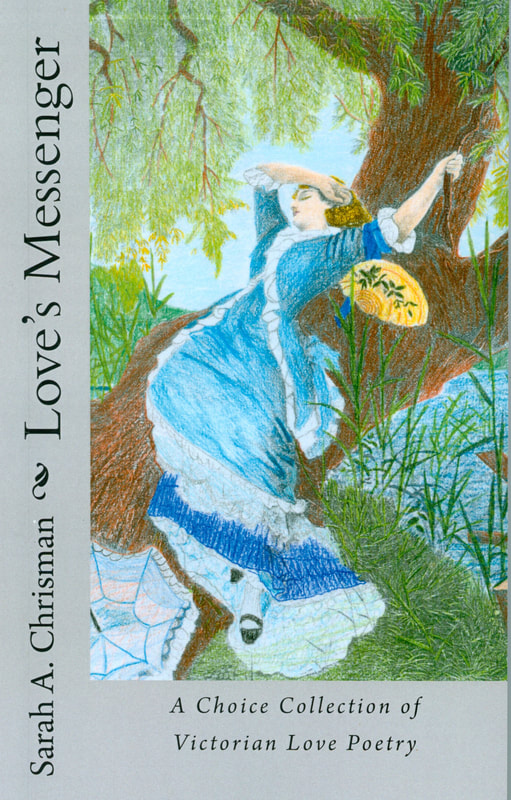Love's Messenger
A Choice Collection of
Victorian Love Poetry
There is something magical about poetry. The memory clings to it more tightly than to prose, and often the slightest allusion will recall a verse, stanza, or entire poem from the vague mists of a forgotten past. To train their memories Victorian children recited poems of increasing length and complexity as they grew, and by the time they reached adulthood poetry itself was such a comfortable friend to them that popular games involved making up verses on the spot or reciting poems backwards (from memory!) while a crowd of giggling friends attempted distractions. From the humdrum to the sacred, poetry permeated life. It was used for every purpose from selling corsets to exalting the divine —and, as it has been since time immemorial, it was used to make love. Victorian love poetry ranges from poignant little peeps at simple couples whose only wealth was their devotion to sublime praise of love immortal. When we read the poetry of the Victorians we feel our own hearts quicken as we share their intimacies.
Details of life change over time but certain elements are constants of the human condition: love is the most beautiful of all of these. There is a sweet familiarity to the description of a heart thrilling at a beloved's touch, no matter where or when the lovers may be meeting. At the same time, each love is uniquely its own. The precise way it blossoms depends on the lovers' personalities and their stations in life. It is appropriate that English speakers often compare love to honey: it is always sweet yet the subtle notes of that sweetness are flavored in different ways by the flowers from which the nectar is drawn. Honey gathered exclusively from blackberry blossoms has a distinct tang, while honey drawn from roses tastes of the queen of flowers. The richest honey combines the flavors of many blooms, and this choice collection of poetry takes a lesson from the bees. Shy maidens and coquettes, eloquent gentlemen and simple lads of rough education but pure hearts all play their part here, and the language of each poem is a reflection of the sweethearts' personalities.
The volume opens, appropriately enough, with the story of a love token which has lain long buried, and which is then unearthed and marvelled at by later generations. From there the collection follows the course of love itself, from the first shy and timid glances to the deep devotion of wedded bliss. It is not an overly large book, but then I always felt that a book of love poetry should be small enough to hold close to the heart. It is love itself which fills the world.
—Sarah A. Chrisman
Near the deep forest, dim with leafy shadow,
Relieved by sunny glade,
A sturdy oak, o'er green and fragrant meadow,
Once threw a welcome shade.
Here children oft in summer days were playing:
Here lovers held their tryst
When all the verdant boughs were gently swaying,
By evening zephyr kissed.
In stately pride the monarch stood for ages,
Through sunshine and through storm;
And no rude blast, that round the forest rages,
Had marred his kingly form.
One day the sky, aglow with noon-day gladness,
Grew dark with sudden woe;
The cyclone wild, descending into madness,
The mighty oak laid low.
When morning sunshine bathed the earth with splendor,
Crowds came and by it stood,
And noticed, as they spoke in accents tender,
A curious knot of wood.
They hewed it open, that they might discover
The secret buried there,
And found—no doubt 'twas hidden by a lover--
A lock of sunny hair.
Within the oak's tough bark the knot was driven,
Two centuries before;
They counted, from the place the trunk was riven,
Two hundred rings and more.
The silent oak repaid no further question;
That waving tress of hair
Betrayed the secret, with the sweet suggestion
Of lovers' meeting there.
When summer moonlight tinged with silver glory
The velvety green earth,
Beneath its boughs was told the wondrous story,
As old as Eden's birth.
Sweet promises were made, fond vows were spoken,
And sealed with solemn oath;
This golden curl was given as a token--
Bright emblem of their troth.
In kindly heart of oak, through years unnumbered,
Reposed the precious trust,
While the fair head, from which the curl was sundered,
Had mingled with the dust.
And many youths and maidens, hither straying,
Had owned love's potent spell;
Yet still the stalwart trunk and branches swaying
Had kept the secret well.
While tales of cruel strife, and warriors' glory,
The world may well forget,
Around the humble sweetness of this story
The fragrance lingers yet.
For still, though empires fall, and monarchs perish,
Though planets cease to move,
Throughout all change, mankind will ever cherish
Thy name, O deathless Love!
—Marie Corinne
Peterson's Magazine, September, 1883, p. 237.

 RSS Feed
RSS Feed